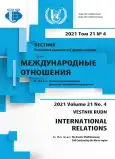Магриб - 2021: тупики внутриполитического развития и угрозы региональной подсистеме отношений
- Авторы: Кузнецов В.А.1, Василенко А.И.1
-
Учреждения:
- Национальный исследовательский институт мировой экономики и международных отношений имени Е.М. Примакова Российской академии наук
- Выпуск: Том 21, № 4 (2021): Большое Средиземноморье: продолжая конструировать макрорегион
- Страницы: 642-654
- Раздел: ТЕМАТИЧЕСКОЕ ДОСЬЕ
- URL: https://journal-vniispk.ru/2313-0660/article/view/320272
- DOI: https://doi.org/10.22363/2313-0660-2021-21-4-642-654
- ID: 320272
Цитировать
Полный текст
Аннотация
Статья посвящена актуальным проблемам развития международных отношений в субрегионе Магриба, приобретшим особую остроту после разрыва в августе 2021 г. дипломатических отношений между Алжиром и Марокко. Анализируя общие параметры магрибинской подсистемы международных отношений и выявляя основные тенденции внутриполитического развития входящих в нее государств, авторы показывают, что нарастающая напряженность в двусторонних отношениях между Алжиром и Марокко является лишь симптомом общего кризиса региональной подсистемы. Исследование основано на анализе широкого массива информационно-аналитических материалов и документов, а также на материалах полевых исследований авторов в приграничных районах Марокко (2019) и Алжира (2018, 2019) и их интервью с магрибинскими политиками (2020, 2021). В первой части статьи выделяются ключевые параметры магрибинской подсистемы отношений, описывается ее внутренняя архитектура, выявляются взаимосвязи с иными региональными подсистемами, показываются тренды развития Магриба, оформившиеся в 2010-е гг. Во второй части анализируется внутриполитическая динамика в Ливии, Тунисе и Алжире. Текущая ситуация в каждой из стран описывается как тупиковая как с точки зрения развития демократического процесса, так и в плане возможностей национальной консолидации на авторитарной основе. Проявлением этого становится нарастающее отчуждение общества от политических элит, неспособных предложить реалистичные стратегии государственного развития. В третьей части статьи выявляются последствия кризисов внутриполитического развития для региональных отношений. Показывается возможность частичной переориентации ряда государств Магриба с более глубокой средиземноморской интеграции на поиск иных союзников; выявляются перспективы перебалансировки отношений с арабскими партнерами; делается вывод о возможном использовании конфликтной внешнеполитической повестки для национальной консолидации ряда стран; ставится вопрос о поисках новых моделей государственного и регионального развития.
Об авторах
Василий Александрович Кузнецов
Национальный исследовательский институт мировой экономики и международных отношений имени Е.М. Примакова Российской академии наук
Автор, ответственный за переписку.
Email: vasiakuznets@yandex.ru
ORCID iD: 0000-0003-3646-4037
кандидат исторических наук, ведущий научный сотрудник лаборатории «Центр ближневосточных исследований»
Москва, Российская ФедерацияАнастасия Игоревна Василенко
Национальный исследовательский институт мировой экономики и международных отношений имени Е.М. Примакова Российской академии наук
Email: avasilenkan@gmail.com
ORCID iD: 0000-0002-1027-6137
младший научный сотрудник лаборатории «Центр ближневосточных исследований»
Москва, Российская ФедерацияСписок литературы
- Bauman, Z. (1994). Controversy over postmodernism. Sociological Journal, (4), 69-80. (In Russian).
- Baranovsky, V. G. & Naumkin, V. V. (Eds.). (2018). The Middle East in the changing global context. Moscow: IV RAN publ. (In Russian).
- Vidyasova, M. F. (1987). Social structures of the pre-colonial Maghreb. Genesis and typology. Moscow: Nauka publ. (In Russian).
- Volodina, M. A. (2015). Algerian-Moroccan relations in the light of the Western Sahara conflict. Russia and the Muslim World, (10), 106-114. (In Russian).
- Zheltov, V. V., & Zheltov, M. V. (2015). Algeria: Reforms as a consequence of the Arab Spring. Bulletin of Kemerovo State University, (2-2), 33-38. (In Russian).
- Kuznetsov, V. A. (2018). The hidden paths of Tunisia: Living and telling the revolution. Moscow: GAUGN-Press publ. (In Russian).
- Bin-Nun, Y. (2002). Les relations secrètes entre le Maroc et Israël et l’émigration juive, de l’indépendance du Maroc au naufrage d’Egoz, 1956-1960 [thesis]. Paris : École Pratique des Hautes Etudes.
- Boukhars, A. (2019). Reassessing the power of regional security providers: The case of Algeria and Morocco. Middle Eastern Studies, 55(2), 242-260. https://doi.org/10.1080/00263206.2018.1538968
- Daguzan, J.-F. (2015). La politique étrangère de l’Algérie: le temps de l’aventure? Politique étrangère, (3), 31-42.
- De Larramendi, M. H. (2018). Doomed regionalism in a redrawn Maghreb? The changing shape of the rivalry between Algeria and Morocco in the post-2011 era. The Journal of North African Studies, 24(3), 506-531. https://doi.org/10.1080/13629387.2018.1454657
- Khalfaoui, S. (2020). Reconfigurations de l’exécutif tunisien pendant la crise du Covid-19. In H. Redissi (Dir.), La Tunisie à l’épreuve du Covid-19 (pp. 201-215). La Friedrich-Ebert-Stiftung, Bureau de Tunis
- Labaronne, D. (2013). Les difficultés de l’intégration économique régionale des pays maghrébins. Mondes en développement, 163(3), 99-113. https://doi.org/10.3917/med.163.0099
- Lacher, W. (2020). Libya’s fragmentation: Structure and process in violent conflict. London: I.B. Tauris.
- Lefèvre, R. (2016). Morocco, Algeria and the Maghreb’s Cold War. Journal of North African Studies, 21(5), 735-740
- M’rad, H. (2015). Le dialogue national en Tunisie. Tunis: Editions Nirvana
- Marzo, P. (2020). La dimension internationale de la transition démocratique en Tunisie. Défis méthodologiques d’une recherche qualitative. Recherches Qualitatives, 39(1), 42-61. https://doi.org/10.7202/1070015ar
- Monciaud, D. (2021). Le « rapport Stora »: un premier débat sur les enjeux mémoriels. Cahiers d’Histoire. Revue d’Histoire Critique, (149), 137-161. https://doi.org/10.4000/chrhc.16509
- Rosenau, J. N. (1980). The scientific study of foreign policy. London, New York: Frances Pinter and Nichols Publishing.
- Slimani, S. (Ed.). (2019). La révolution du sourire. Tizi-Ouzou: Editions Frantz Fanon.
- Tayeb, C. (2005). La dynamique de la frontière au Maghreb. In UNESCO, International Committee of Historical Sciences (Eds.), Des frontières en Afrique du XIIe au XXe siècle (pp. 191-212). Paris: Stedi Media
- Volpi, F. (2013). Algeria versus the Arab Spring. Journal of Democracy, 24(3), 104-115.
- Waltz, K. N. (1979). Theory of international politics. Boston: Addison-Wesley.
- Zoubir, Y. H. (2000). Algerian-Moroccan relations and their impact on Maghribi integration. The Journal of North African Studies, (5), 43-74.
- Zoubir, Y. H. (2019). Chinese relations with the Maghreb: The leading role of Algeria. Confluences Méditerranée, 109(2), 91-103. https://doi.org/10.3917/come.109.0091
- Zoubir, Y. H., & White, G. (Eds.). (2015). North African politics. Change and continuity. London: Routledge.
Дополнительные файлы









